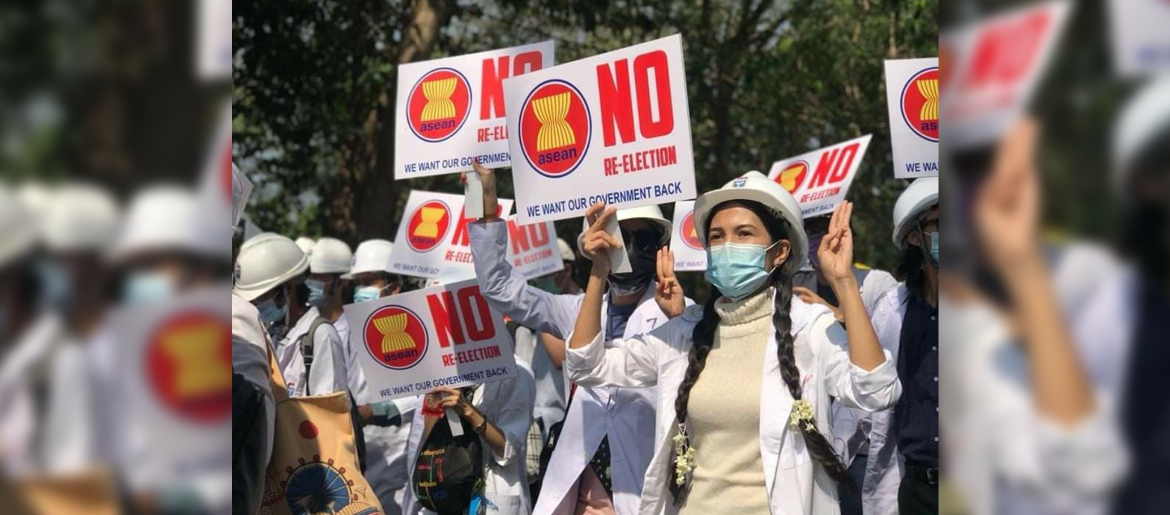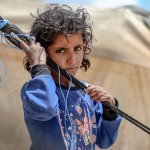When news breaks of awful things happening in other countries – particularly abuses of power like in the Indian farmer protests and Myanmar military coup – the most common questions we get asked is: “How can we help them?” While it’s easy to share posts on social media, beyond that, how can Australia help other countries in crisis? Particularly in cases of corrupt leaders taking advantage of their own people, you may be wondering if the Australian Government can or should be doing something too.
We asked Dr Darren Lim — senior lecturer in international relations at Australian National University, and co-host of the Australia in the World podcast — what tools the Australian Government can use in situations like India and Myanmar. He explains that, in reality, there are only a few ways Australia can help other countries. They’re more subtle and slow-burn than you might think.
Australia put out a statement condemning the actions of the Myanmar military. Does making statements have any real impact?
“Do statements achieve anything concrete? No. The ‘sticks and stones’ logic applies; governments that do these terrible things don’t tend to care too much what the rest of the world thinks. That leads to the question of ‘how can we make these statements more meaningful’? The simple answer is to work in numbers – joining together in groups of governments and collectively say “This is unacceptable.” Even though autocrats and dictators don’t care what the world thinks, they do still want to be seen as legitimate on the world stage. And if you are constantly being criticised and ostracised on the world stage, at the margins it might stop them from being even worse than they already are.
There is also a rule that you’re more likely to listen to your friends than anyone else. The best country to criticise Australia is New Zealand, and the best country to criticise Myanmar is somewhere it sees as being similar to itself.
It’s easy to dismiss that statements are just posturing for our own domestic audience, but at a time when democracy is under pressure – every democracy should take the opportunity to stick up for its values where it can. And if the only impact is strengthening Australia’s resolve to uphold these values ourselves, that’s still a good thing.”
THE TAKEAWAY: Making a formal statement is the bare minimum. Making a formal statement in groups, especially with countries from a similar region, is better. And even though it’s unlikely to create any immediate change, it’s still important for reinforcing democratic norms worldwide.
The UNSC shares our deep concern about developments in Myanmar and calls on the military to immediately release those detained arbitrarily. https://t.co/n8pLKgB5Xr https://t.co/WkwqTwr9g6
— Marise Payne (@MarisePayne) February 5, 2021
How effective are economic sanctions in influencing foreign governments?
“With sanctions you often have two problems. The first is a ‘rally around the flag’ effect – you have a Western power who is telling this country what to do, which gives a PR opportunity to these dictators to say: “I am defending our nation from US aggression.”
The second problem is sanctions are asking that government to give up something it really cares about. For example, in North Korea’s case, it’s “We want you to stop developing nuclear weapons.” North Korea has been sanctioned on and off for decades for having a nuclear weapons program. But having nuclear weapons is fundamental to the security of Kim Jong-un’s regime. So sanctions tend not to raise the costs high enough to be worth it. Giving up nuclear weapons is worse for North Korea than any damage the West can do economically. Often what you’re asking for is regime change – you’re asking them to fundamentally give up all their wealth and power. And they don’t want to do that.
That doesn’t mean we shouldn’t use sanctions. They signal displeasure, and it can shift political power. But we have to be realistic in whether they are going to procure the political change that we would like.”
THE TAKEAWAY: Generally, economic sanctions are never high or expensive enough to get the foreign Government to give up their abusive power or corrupt wealth.
Is Australia any good at imposing economic sanctions?
“Australia doesn’t have the weight, we don’t dominate trade in that way. And this is actually true for any individual country. Sanctions only work if everyone participates, because if one country says no, you can usually find the same goods redirected through a third country. China put a ban on Norwegian salmon after they awarded a Nobel Prize to a Chinese dissident in 2010. What ended up happening is it got routed through Vietnam – Vietnamese exports of fancy salmon to China went up, and everyone assumes the reason was they were being a third party. So for sanctions to work they have to be multilateral.”
THE TAKEAWAY: Sanctions work best if multiple countries work together.
Related Posts
So what else can Australia actually do to help countries in crisis? Especially when a government is harming its own people?
“There is very little that is going to achieve short term change. It is painfully incremental work in this kind of space, and that means you will not see results for years or decades if you see them at all. We have to be realistic, especially convincing leaders who treat their people badly not to do that – it’s tough.
To help over the long term we can try to build and strengthen democratic institutions; liberalism; free press; an impartial civil service and other civil actors like human rights organisations. To give them support, expertise, and resources where it’s politically acceptable to strengthen [the system] so that when leaders try to overstep those bounds, there is push back. Ultimately change in these countries comes from within, and so you’re trying to create the long term conditions for that.
Part of the story is military-to-military engagement. For example, the Australian Defence Force does stuff with the Myanmar military. The logic for that is you want to develop the norms by using persuasive influence. “Look, we’re a very protective defence force, we do lots of cool stuff, but we don’t involve ourselves in politics. We don’t need to, we have a different job.” You’re trying to socialise the Burmese military into these norms. But that is a decades-long project.
None of this removes the risk entirely, but it builds up the capacity or resilience of political institutions, giving them a liberal dimension, and hope that the system can act to constrain the excessive use of power when the time comes. But it’s slow, for every step forward there can be three steps back, it can be very frustrating.
The worst thing we can do is be very cynical and say well we can’t do anything… But we are a middle power at best and we have to accept that there are limits on what we can achieve.”
THE TAKEAWAY: Real change has to come from within the country itself. Australia can help countries in crisis by supporting and working with their institutions to show them how to behave in a fair, democratic way. It’s a very long term play of soft influence rather than force.
Dr Lim co-hosts the weekly foreign policy podcast, Australia in the World, which you can listen to here.






